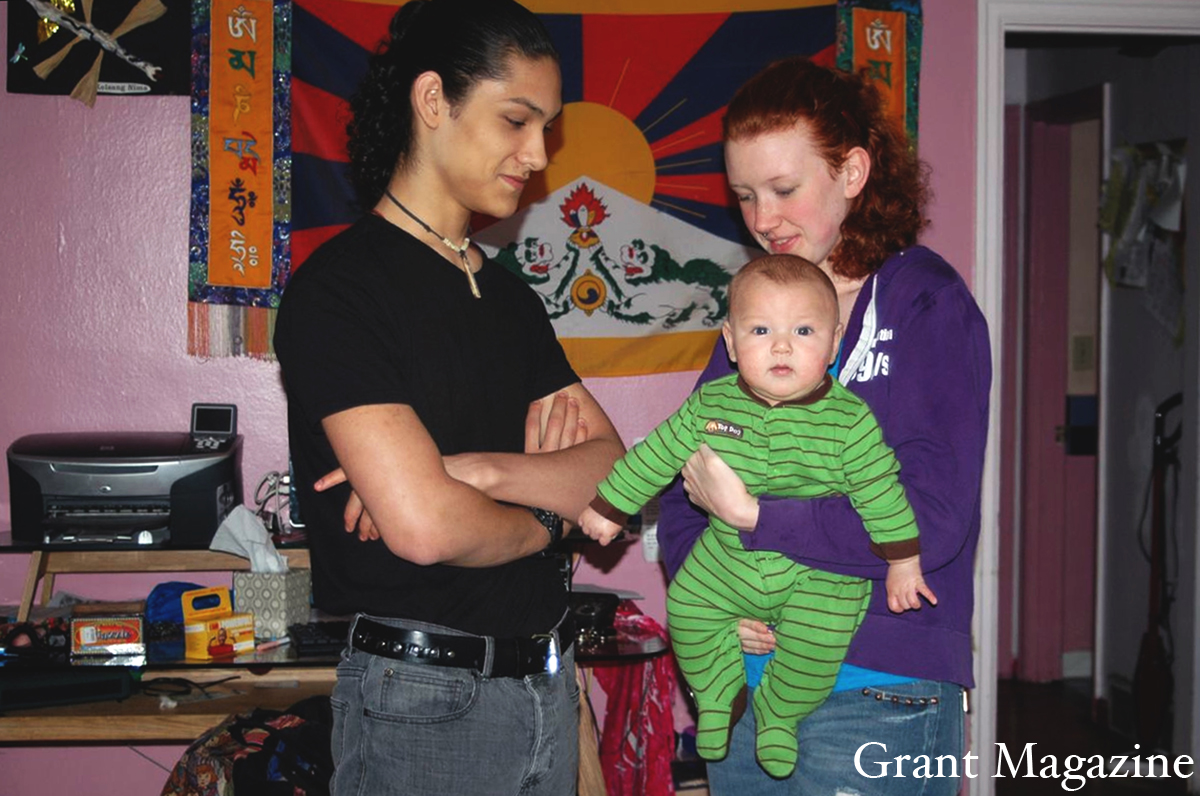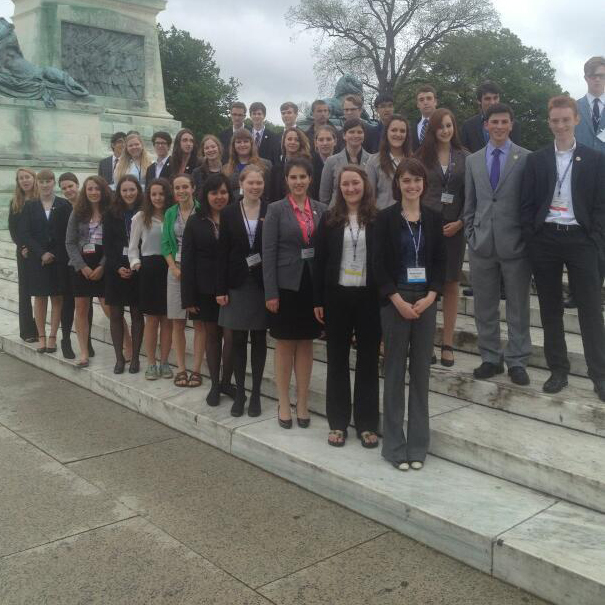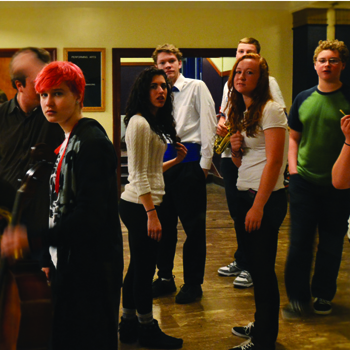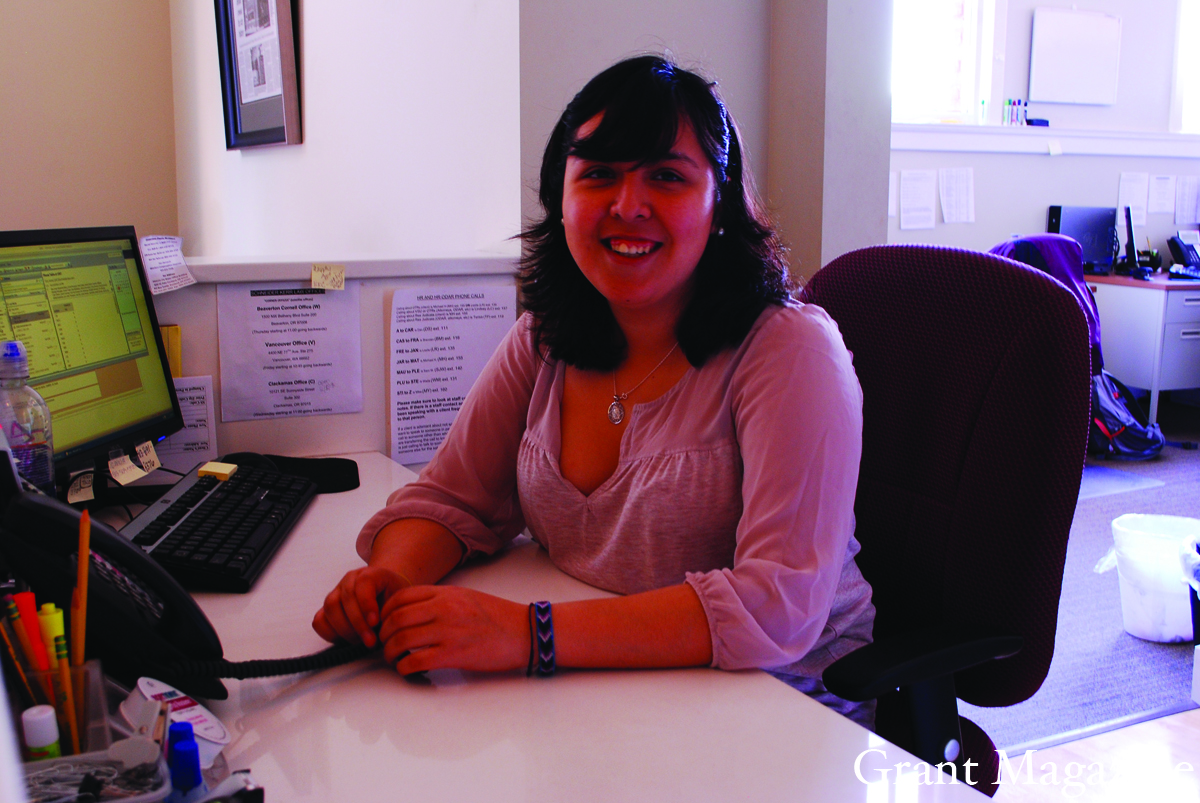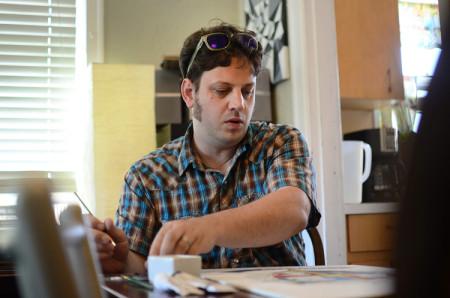It seemed like it would be just another night for Kelsang Nima. His freshman year at Grant High School was drawing to a close, and he and his family sat scattered around the living room eating dinner in their Northeast Portland home.
Nima’s phone vibrated and he reached for his pocket. It was his friend, Rebekah McLain. He answered, and in the following moment received news that would change his life forever.
“I’m pregnant with your kid,” McLain told him, not wasting any time. Her words caught Nima off guard.
“It was just a shock,” 16-year-old Nima recalls now. “You’re just sitting there, you’re shocked, and you’re thinking about a whole bunch of different things, all the scenarios.”
A moment like that is enough to send many teens over the edge. Do they try to avoid the situation? Do they look for a way out? After all, being a teen parent clearly comes with a stigma.
Nima, though, remained centered.
“For me, it’s not very dramatic. It’s a new thing I have to deal with,” he says. “I made this happen and I have to share responsibility. It’s out of the question not to.”
Ernesto Dominguez, an education outreach coordinator for Planned Parenthood, says his agency works hard to push a message of prevention. Teens, he says, need information to help shape their choices. But that doesn’t always sink in. Dominguez says: “One in every 500 15- to 19-year-olds is a parenting teen.”
But for many teens, having a child is not an option. According to the Guttmacher Institute, there are about 750,000 American teens who get pregnant each year, and about 30 percent of them have abortions.
But Nima and McLain, who attends Madison High School, represent a different story. While many teens fear that having a child will drastically alter their future, Nima’s plans haven’t changed. He takes care of his infant son at least once a week and continues to work hard at school.
“Keeping up on my grades is benefitting him because I’ll get a good job so I can support him more in the future,” says Nima.
Growing up, Nima was a quiet kid who enjoyed reading and had an overwhelming passion for science. His mother, Jill Nima, remembers a time when Nima was just four years old. She brought him to his older brother’s second-grade classroom where the zoo was giving a presentation.
She recalls one of the visitors holding a snake and asking: “Why do you think he’s sticking out his tongue? Do you think he’s trying to be rude?”
Nima quickly raised his hand and responded: “No, he’s tasting the air with his Jacobson’s organ.”
“He was like a little scientist,” says Jill Nima. “When he was four, he probably knew more science than most high school kids.”
Nima grew up watching shows like “Bill Nye, the Science Guy” and reading various science books. His main interests at the time were reptiles and biology.
Nima’s favorite thing to do with his family is travel to California to visit his grandparents. The small town that he looks forward to visiting every summer is filled with abundant Redwood trees and a great view of the Pacific Ocean.
But this summer, things may look a little different for Nima because of Rowan, the latest addition to the family.
McLain, who is 15, remembers the day she found out she was pregnant. She took a pregnancy test alongside her closest friend. At first, the positive result meant she would be taking an immediate trip to Planned Parenthood. After discussing the abortion procedure with the doctor, she told him: “OK, I’ll think about it.”
But McLain couldn’t do it.
“I just kinda felt like if I didn’t have this baby, I would be ending the possibility of something,” she says. She felt like “it was kinda supposed to happen, and getting rid of it was like seriously messing with the universe.”
Within a week of making her decision, she told Nima, who wasn’t too happy at first. The next step? Breaking the news to her parents.
“They always would say I was too smart for that,” says McLain. “They were both surprised but they got over it. Now they just really love Rowan.”
Likewise for Nima, who at the age of 16 never expected to become a father. The hectic moments leading up to the birth will stay with him forever. “I was nervous and anxious,” Nima recalls.
He remembers the drive to the hospital with his parents the night his son arrived. Nima sat by McLain’s side for more than five hours. As McLain’s contractions grew, Nima’s parents left the birthing room to lessen the crowd.
Never before experiencing a situation like this, Nima says: “It was different. I can’t really describe it, but I felt relieved that Rebekah was done with pregnancy.”
And when his son was finally born, reality kicked in: He was now a father with a lot of new responsibilities.
But teen parents like Nima are not alone. There are many support systems available outside the home. In the Portland Public Schools district, there’s a Teen Parenting Services program located at Meek School.
The Mission? “To support pregnant and parenting students in achieving their highest potential, personally and academically, while preparing them to contribute to society as citizens of a racially diverse, multicultural and international community,” says the program website.
Ariana Altieri, a teen parent counselor with the program, says being a teen parent and juggling high school can be very difficult.
“Emotionally, I see our young parents go through a period of loss around their adolescence,” she says. “They see their friends having new relationships and experiencing new things which are unavailable to them.”
Altieri’s job is to work closely with the school staff and the students to help with any issues the student may be facing in and out of school.
“Teen Parent Services is in place to make sure that our young parents don’t become a statistic, which puts them in the dropout category,” Altieri says.
In addition to Teen Parent Services, there is another Portland-based program called Insights, which supports teen parents by means of parental education through weekly home visits.
“We’re people with no opinions,” says Tiffany Tucker, the Insights program coordinator whose program currently sees more than 200 young parents. “We make sure they’re stable and have childcare set up so they can complete school.”
Tucker says the experience is daunting. Statistics show that most teen parents don’t end up getting a college degree.
Grant vice principal Curtis Wilson knows the drawbacks personally. He is, in his own words, “the product of a teenaged parent” and was raised by a single mom.
“I’m not gonna lie, it was hard on her,” Wilson recalls. “Sometimes she wanted to be a kid: she still wanted to do teenage things.”
However, Wilson believes a teen parent’s goals are still attainable, even with a child to care for.
“If you still want to go to college and you still want to pursue your career, that can still happen,” he says. “You just really have to work hard at it. You’ve got to refocus.”
Nima and McLain are lucky because their families have remained by their sides, allowing them to remain in school full time. While most parents would be furious if their teen had a child, Nima’s mother took it in stride.
“When you have a baby, all it really needs is love. Talking about what could have been is pointless,” says Jill Nima. “What a baby needs is a supportive family and that’s what he has. I feel it’s brought more joy into his life.”
Nima’s father, Tsering Nima, felt slightly different at first. He adds: “It wasn’t something that we hoped for, but it happened and we accept it and support him.”
Nima attributes the positive mindset about teen parenthood to their Tibetan Buddhist way of life.
“Tibetan Buddhism is all about embracing each other in humanity as equals, and getting rid of the ideas of selfishness and the concept of ‘I,’” Nima says. “A way to sum it up is that it’s not complicated. It’s a religion of kindness.”
To symbolize his faith, Nima wears a spiritual necklace every day inscribed with the prayer “Oṃ ma ṇi pad me hūṃ”
“It’s basically a prayer to all six realms of physical existence,” he says. “It’s one of the most important prayers. And it’s the most simple so it’s the best to have.”
On one of Nima’s earlier trips to California, he was introduced to a monk who revealed to him why he should really want to be a Buddhist. The monk told him that Buddhism is not something that should be followed blindly.
Nima wants to make sure that his son understands Buddhism like he does now. “I just want to teach him Buddhism and integrate it so it’s natural,” Nima says. “I’ll have him know it is a part of his culture and that it’ll eventually become a part of him.”
Staying true to her family’s philosophy, Jill Nima has taken in foster kids for more than nine years. Beginning as a therapeutic foster parent who took in troubled kids for short periods of time, she eventually moved on to long-term foster care.
“Therapeutic foster care was hard because the children always wanted to stay longer,” she says, referring to the three month contracts they usually had.
And when the youngest child of her own was born, who is now seven, Jill Nima decided she would take on foster care as a full-time job.
“As a Buddhist, I need to help others,” she says. “I can’t sit behind a desk and do something that’s meaningless.
Jill Nima has taken in around 20 children. Most of the kids were deemed difficult to raise before entering her home. But once they reached adulthood or the end of their contract, the biggest challenge was saying goodbye.
“It has made (Kelsang Nima) stronger being exposed to so many people with different backgrounds,” she says. “He very compassionate to people, and kids who are different or maybe disabled, (he’s) very tolerant.”
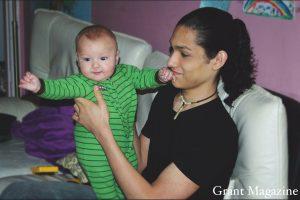 Nima is currently juggling his responsibilities as a father with his academics. Always a motivated student, perhaps Nima’s drive has stemmed from Tsering Nima, whose value on education is tremendously high.
Nima is currently juggling his responsibilities as a father with his academics. Always a motivated student, perhaps Nima’s drive has stemmed from Tsering Nima, whose value on education is tremendously high.
Tsering Nima was about three years old when he fled to Nepal from Tibet because of the invasion by the Chinese. From Nepal as a refugee, his family traveled to India where he went to school for many years, until receiving a scholarship to Woodward College in England. His final destination for education would be Oregon, where he would graduate from George Fox University before going on to meet his wife.
“Right now, it’s an advancing world, and without education, you’re left behind,” says Tsering Nima. “If you have an education you have better opportunity, and you have a better quality of life.”
In the near future, he hopes to see his son following his dreams at a prestigious university. “Princeton, Harvard, Yale, Stanford. Any of those,” he says.
Tsering Nima has shared his value of education with his son, and is proud to see him doing well.
Now in his sophomore year of high school, Nima is currently taking AP Chemistry, which is regarded as one of the most challenging course at Grant. Next year, he plans to take physics.
Chemistry teacher William Wilson says Nima is always very involved in his class and always asks really good questions.
“Physics is what I’m really interested in,” Nima says. “Just how you can make matter do anything you want it to and really look into these energy sources that could potentially propel humanity across the cosmos. All this potential lies in physics and it’s just sitting there waiting for us.”
Although he says that in physics matter can easily be manipulated, he now realizes his life doesn’t work that same way.
Rowan spends the weekdays at McLain’s house. On Friday, Nima normally visits them, but on Saturday Rowan is Nima’s responsibility. Although Rowan is still at a point where he sleeps a lot, Nima does what he can while his son is awake.
“I just hold him, rock him. When he wakes up, I try to play with him, talk to him. I get him to see a lot of stuff so his brain grows more,” says Nima. “I like to read him more adult books. I’ll try to get him to be more advanced.”
McLain feels like raising a baby is gradually getting easier as it becomes part of her routine.
“Everything you don’t even think about having to take care of for yourself, you have to remember to get it taken care of with the baby,” says McLain. “He’s starting to sleep longer now that he’s older, but there are some nights where he just cries and cries and cries until two in the morning.”
McLain now finds herself dealing with the responsibilities of having a child.
“It’s a little more challenging, but I’m getting everything done and I’m keeping up in my classes,” says McLain. “My parents are a lot of help.”
Like McLain, Nima also sees that spending time with his son is the absolute most important thing.
“I’m willing to spend time with him over my other stuff,” he says. “As an infant, he’s growing very rapidly, and he’s recognizing everything as his surroundings. I want him to recognize me as a normal part of his surroundings.”
Ultimately it’s Nima’s intelligence that will take him far in life. With plans to attend a four year university and study science, Nima says he’d like to follow in his grandfather’s footsteps by attending Stanford University. But since having a child, he says going to a prestigious college closer to home is more realistic. An option near home that he sees fit: Reed College because of its nuclear reactor.
But when he leaves for college, Rowan will only be two years old. While Jill Nima looks forward to seeing her son blossom, she’s concerned for his relationship with Rowan if he decides to move out of state.
“If he ends up having to leave town, he’ll have to Skype with his son,” says Jill Nima. “I think that will be emotionally difficult.”
Regardless, Jill Nima wants what’s best for the entire family.
“If he ends up winning a scholarship that’s not in the state he can’t just turn it down, it’s for the betterment of his child’s life,” she says.
































